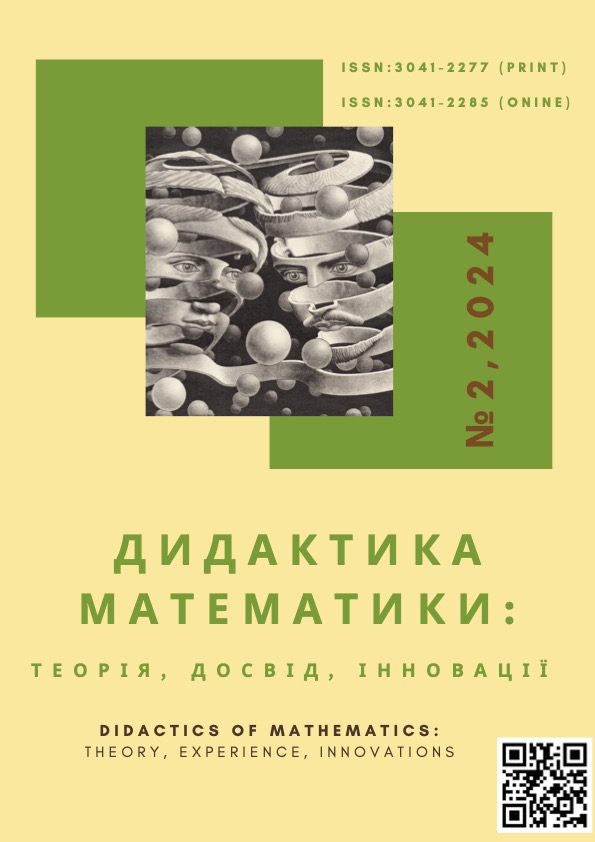Information and communication competence of schoolchildren in the conditions of blended learning
https://doi.org/10.31652/3041-2277-2024-2-56-69Published 2024-12-26
Keywords
- Blended learning,
- information and communication competence,
- mathematics,
- psychological and pedagogical foundations
Copyright (c) 2024 Марина Андрієвська, Любов Михайленко

This work is licensed under a Creative Commons Attribution 4.0 International License.
How to Cite
Abstract
Modern education is undergoing significant changes due to the development of information technologies, particularly the increasing popularity of blended learning. In connection with the rapid information and digital advancement, there arises a necessity to form information and communication competence in students. This competence implies confident, critical, and responsible use of digital technologies for personal development and communication, as well as the ability to safely apply information and communication tools in educational and other life situations while adhering to the principles of academic integrity.
The mathematical education sector is an essential component of general education, which also requires adaptation to the new conditions of blended learning. Therefore, there is a need for in-depth research into the psychological and pedagogical foundations of forming information and communication competence in students within the context of blended learning. This article analyzes psychological and pedagogical literature and explores the works of researchers focusing on the psychological and pedagogical principles of developing students' information and communication competence in blended learning, specifically in mathematics classes.
The conclusion emphasizes that for effective development of information and communication competence in blended learning settings, it is essential to consider cognitive, social, and emotional factors, which will help create a learning environment where students can not only acquire knowledge but also develop their information and communication skills necessary for the modern information society.
Downloads
References
- Биков, В. Ю., & Пінчук, О. П. (Ред.). (2019). Цифрова трансформація відкритих освітніх середовищ: колективна монографія. Київ: ФОП Ямчинський О. В.
- Білоус, О. В., Гриценчук, О. О., Іванюк, І. В., Кравчина, О. Є., Лещенко, М. П., Малицька, І. Д., Морзе, Н. В., Овчарук, О. В., Рождественська, Д. Б., Сороко, Н. В., Тимчук, Л. І., Ткаченко, В. А., Шиненко, М. А., & Яцишин, А. В. (2014). Формування інформаційно-комунікаційних компетентностей у контексті євроінтеграційних процесів створення інформаційного освітнього простору (В. Ю. Биков & О. В. Овчарук, Ред.). НАПН України, Інститут інформаційних технологій і засобів навчання. Атіка.
- Зайцева Н. В., Симоненко, С. В., & Супрун, О. М. (2021). Психолого-педагогічні особливості дистанційної та змішаної форм навчання у закладах вищої освіти. Педагогічний вісник, (4), 10-14. Отримано з http://elar.tsatu.edu.ua/bitstream/123456789/16154/1/Zaitseva_Ped._visnyk_2021.pdf
- Кабінет Міністрів України. (2020). Державний стандарт базової середньої освіти. Затверджено постановою Кабінету Міністрів України від 30 вересня 2020 р. № 898. Отримано з https://zakon.rada.gov.ua/laws/show/898-2020-%D0%BF#Text
- Лук'янова, Л. Б., & Годлевська, К. В. (2024). Теоретико-методологічний (контекстний) аналіз змішаного навчання та перспективи його впровадження у сучасній освітній практиці. Сучасні інформаційні технології в освіті, 13(198). Отримано з https://vspu.net/sit/index.php/sit/issue/view/198/198
- Максименко, С., Деркач, Л., Кіричевська, Е., & Касинець, М. (2022). Психологія когнітивних процесів: науковий посібник. Київ: Видавництво Людмила. Отримано з https://lib.iitta.gov.ua/id/eprint/733528/1/3Психологія%20когнітивних%20%20процесів%20%281%29.pdf
- Матохнюк, Л. О. (2019). Психологія інформаційної компетентності особистості (ґенеза онтологічного розвитку). Дисертація доктора психологічних наук, Державний заклад «Південноукраїнський національний педагогічний університет імені К. Д. Ушинського». Отримано з http://dspace.pdpu.edu.ua/handle/123456789/4150
- Матяш, О., Михайленко, Л., & Воєвода, А. (2022). Актуальні аспекти міжнародних досліджень використання інформаційних технологій навчання в галузі математичної освіти. Modern Information Technologies and Innovation Methodologies of Education in Professional Training Methodology Theory Experience Problems, 81–90. https://doi.org/10.31652/2412-1142-2021-60-81-90
- Матяш, О., Коваль, О., & Михайленко, Л. (2022). Формування в учнів інтересу до математичних задач та їх розв’язування. Modern Information Technologies and Innovation Methodologies of Education in Professional Training Methodology Theory Experience Problems, 103–113. https://doi.org/10.31652/2412-1142-2022-65-103-113
- Михайленко, Л., & Андрієвська, М. (2024). Особливості формування інформаційно-комунікаційної компетентності учнів на уроках математики. Modern Information Technologies and Innovation Methodologies of Education in Professional Training Methodology Theory Experience Problems, (70), 188–198. https://doi.org/10.31652/2412-1142-2023-70-188-198
- Підчасов, Є., Овчар, Н., Лазарєва, Т., Чепелєва, Н., & Вишняк, М. (2022). Психолого-педагогічні особливості навчання здобувачів вишів з використанням інтерактивної дошки. https://doi.org/10.52058/2786-4952-2022-2(7)-531-541
- Повірити в дитину – як допомагає в навчанні теорія множинного інтелекту. (б.д.). Нова українська школа | Веб-ресурс НУШ. https://nus.org.ua/articles/poviryty-v-dytynu-yak-dopomagaye-v-navchanni-teoriya-mnozhynnogo-intelektu/
- Резнік, Т. (2023). Психолого-педагогічні засади організації індивідуальних занять з української мови для старшокласників ліцею в умовах змішаного навчання. Věda a perspektivy, (7(26)). https://doi.org/10.52058/2695-1592-2023-7(26)-103-112
- Слєпкань З. І. (2004). Психолого-педагогічні та методичні основи розвивального навчання математики. Тернопіль: Підручники і посібники.
- Столяренко, О. Б. (2012). Психологія особистості: Навчальний посібник. Київ: Центр учбової літератури.
- Український психологічний хаб, (б. д.). | Психолог. https://www.psykholoh.com/post/когнітивний-розвиток-це
- Шроль, Т. С. (2016). Змішане навчання як нова форма організації ІКТ-освіти. Наукові записки РДГУ, 13(56), Частина І, 167-170.
- Cai, C., & Feng, H. (2024). Handbook of Educational Reform Through Blended Learning, edited by Ming Li, Xibin Han, and Jiangang Cheng, Singapore, Springer, 2024, 418 pp., eBook, ISBN: 978-981-99-6269-3. Asia Pacific Journal of Education, 1–4. https://doi.org/10.1080/02188791.2024.2339554
- Krieglstein, F., Beege, M., Rey, G. D., Ginns, P., Krell, M., & Schneider, S. (2022). A systematic meta-analysis of the reliability and validity of subjective cognitive load questionnaires in experimental multimedia learning research. Educational Psychology Review. https://doi.org/10.1007/s10648-022-09683-4
- Marín, V. I., & Castañeda, L. (2023). Developing digital literacy for teaching and learning. In Zawacki-Richter, O., & Jung, I. (Eds.), Handbook of Open, Distance and Digital Education. Springer. https://doi.org/10.1007/978-981-19-2080-6_64
- Sweller, J. (2016). Working memory, long-term memory, and instructional design. Journal of Applied Research in Memory and Cognition, 5(4), 360–367. https://doi.org/10.1016/j.jarmac.2015.12.002
- Skulmowski, A., & Xu, K. M. (2022). Understanding cognitive load in digital and online learning: A new perspective on extraneous cognitive load. Educational Psychology Review, 34, 171–196. https://doi.org/10.1007/s10648-021-09624-7
- Liu, M., Zhao, G., Zhong, Z., & Ma, J. (2024). Theoretical foundations for blended learning. In Li, M., Han, X., & Cheng, J. (Eds.), Handbook of Educational Reform Through Blended Learning. Springer. https://doi.org/10.1007/978-981-99-6269-3_1

